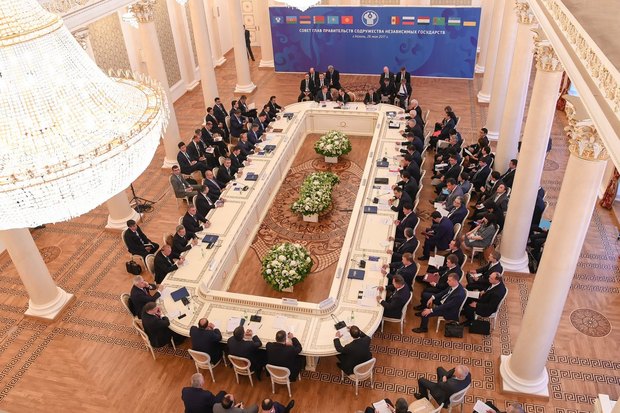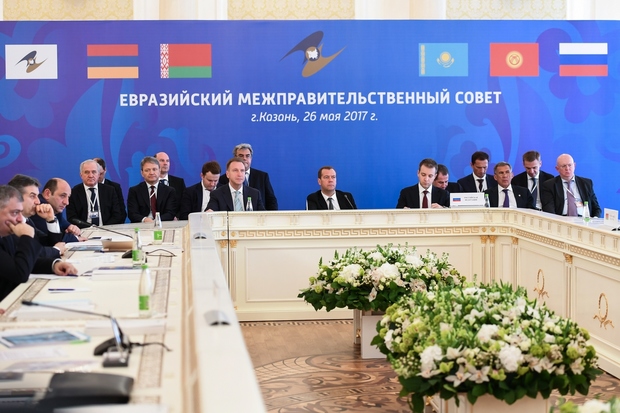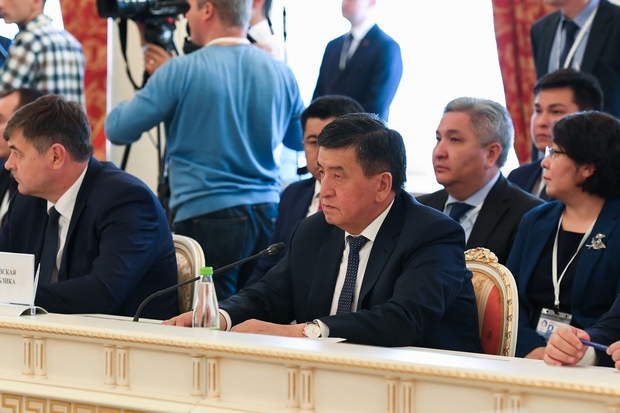Dmitry Medvedev holds in Kazan three events in one visit
The second day of Prime Minister's visit: gratitude for ''organizing'' good weather and again about commercialization of innovations
Three in one: it is how the visit of Dmitry Medvedev in Kazan can be described. In one trip he managed to kill three birds with one stone (to hold three Council meetings). The first one – the Council under RF President on economy modernization and innovative development of Russia, where they discussed the development of technological entrepreneurship in universities, the second — the Council of heads of governments of the CIS, the third — the Eurasian Intergovernmental Council. He was satisfied not only with the results but also with good weather in Kazan, for the ''organization'' of which he thanked the government of Tatarstan. Only locals grumbled, who due to the visit of the high-ranking officials (there arrived the heads of the governments of former Soviet republics) had to sit in traffic jams.
''They managed to cope including with the weather''
Tatarstan's hospitality is a byword, only the lazy would not note it, but Prime Minister decided to go a step further and thanked the authorities of the Republic for ''warm in the literal sense reception'' referring to the fine weather, which was in Kazan these days. Apparently, Dmitry Medvedev got tired of the cold weather.
''Everything has been done well, they have managed to cope including with the weather. I think colleagues who participated are glad,'' said Prime Minister at the press conference devoted to results of the meeting of heads of governments of the Commonwealth of Independent States. Apparently, Prime Minister quipped Moscow that way, which was unable to disperse clouds for 9 May despite the tender, and this topic became the subject of jokes and lively discussions.
The two-day visit of Prime Minister did not remain without attention of not only the press but also ordinary citizens of Kazan who had to sit in traffic jams, while vehicles with VIPs were coming to the city hall and driving away. Those lucky people who didn't have to go through the center of Kazan in the morning and evening could assess the scale of the event by the number of corteges from a photo on Rustam Minnikhanov's Instagram. On a traditional photo of the Liberty square from the President's office there was a few dozen expensive cars on the paid parking. Users of social networks asked a reasonable question: whether the guests had to pay for parking?

Kazakhstani tokamak and commercialization of innovations
On the second day, the first meeting was the Council of heads of governments of the Commonwealth of Independent States. Prime Ministers (except Russia) were from Armenia, Belarus, Kazakhstan, Kyrgyzstan, Tajikistan and Uzbekistan. Azerbaijan, Turkmenistan and Moldova sent their Deputy Prime Ministers.
During the meetings, they signed over a dozen documents that relate to different issues of cooperation in transport, energy and innovative activities, culture and education. For example, Kazakhstan and Russia have agreed on joint use of the unique complex created in Kazakhstan based on the national nuclear center.
''Material science's tokamak is the experimental thermonuclear facility for studying and testing materials in the mode of energy load, which is close to the international ITER project and, at the same time, it does not replace and does not coincide with it. The results of these studies will be required for modernization of industrial reactors and in the development of advanced power reactors and facilities,'' said Dmitry Medvedev.
Continuing the theme raised at the Council under the RF President on economy modernization and innovative development of Russia, Dmitry Medvedev declared that the Association of technoparks of the CIS has been established.
''Another task is the formation of an effective intergovernmental system of commercialization of innovations – it is not yet our strong point, frankly speaking, both in Russia and in the CIS countries we should share commercialization experience,'' said Prime Minister.
Medvedev told about the lack of commercialization of science developments at the meeting with students of the Kazan Federal University dedicated to the development of student technological entrepreneurship. According to him, student startups have not brought a 10% return that the government expected when creating the program to support small innovative enterprises at universities of Russia.

EurAsEC — everyone wins ''despite the fluctuations and the current difficulties''
One council flowed smoothly into the other — Eurasian intergovernmental. The problem discussed were the same, except that the number of participants decreased — member countries of EurAsEC were five: Russia, Kazakhstan, Armenia, Belarus, Tajikistan. According to Medvedev, due to the participation in the Eurasian Economic Community everyone wins ''despite the fluctuations and the current difficulties''.
''We see how complex is still the situation in the global economy, and even under quite unfavourable world market environment the main socio-economic indicators of our countries are slowly improving, including as a result of our joint action. For the period from January to March of this year, the volume of mutual trade increased by a third compared to last year. The same growth was of the exports to third countries, they increased by $ 30 billion. There are positive trends in all countries of our five — I would like to emphasize it separately,'' said the head of the Russian government at the enlarged meeting of the Eurasian Intergovernmental Council.
One of the results of the cooperation — coming into effect in May of the law that regulates the sales of medicinal products and medical devices on common principles that, according to Medvedev, will help to ensure that ''our citizens will receive better and modern medicines and, most importantly, at affordable prices''.
''We have managed to remove the main obstacles for turnover of goods, but the obstacles for the turnover of services, capital and workforce still remain. Over the next years, it is necessary to regulate about two dozen restrictions in industry, agriculture and energy,'' said Prime Minister.
Medvedev noted that this is a complex work that touches on sensitive topics, ''nevertheless I am sure that for every barrier, every confiscation, limitation, it is possible to find an acceptable solution. At the end of the day, we are all interested to create the most convenient conditions for work of entrepreneurs on the single market of the union,'' added Prime Minister.

''One window'' and the cooperation from agroindustrial complex to genetic engineering
Representatives of other EurAsEC countries voiced a similar agenda. In particular, it is necessary as soon as possible to complete the creation of a system of ''single window'' in order to shift to a cross-border paperless trade.
Prime Minister of Armenia Karen Karapetyan called agreement of positions in the field of agriculture the main point.
''Common markets are being formed, we need to position ourselves in relation to third countries with the total export potential of agriculture. For this we have the experience but, of course, we should also deepen the work of the ministries of agriculture of our countries. We have agreed that they will meet more often,'' said Karapetyan.
Prime Minister of Kazakhstan Bakytzhan Sagintayev noted that we need to pay special attention to the speed of supply of goods — ''it will give significant impetus to development of trade and attraction of investments'' — and to study the issue of modernization and creation of new transport corridors.
Prime Minister of the Kyrgyz Republic Sooronbai Zheyenbekov expressed hope for cooperation in the field of genetic engineering, biotechnology, technical re-equipment and introduction of advanced technologies that, in his opinion, will improve the investment attractiveness of the countries.